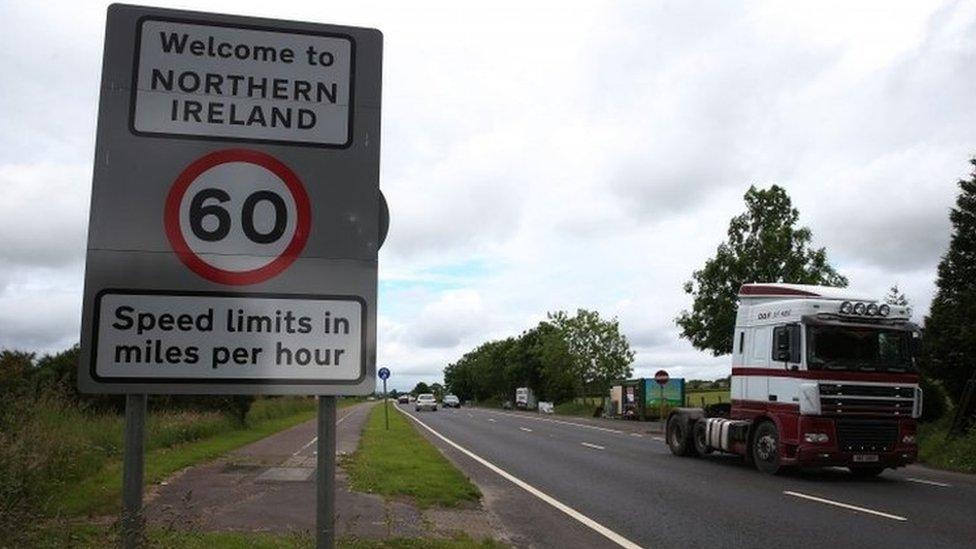Good Friday Agreement was 'work of genius'
- Published
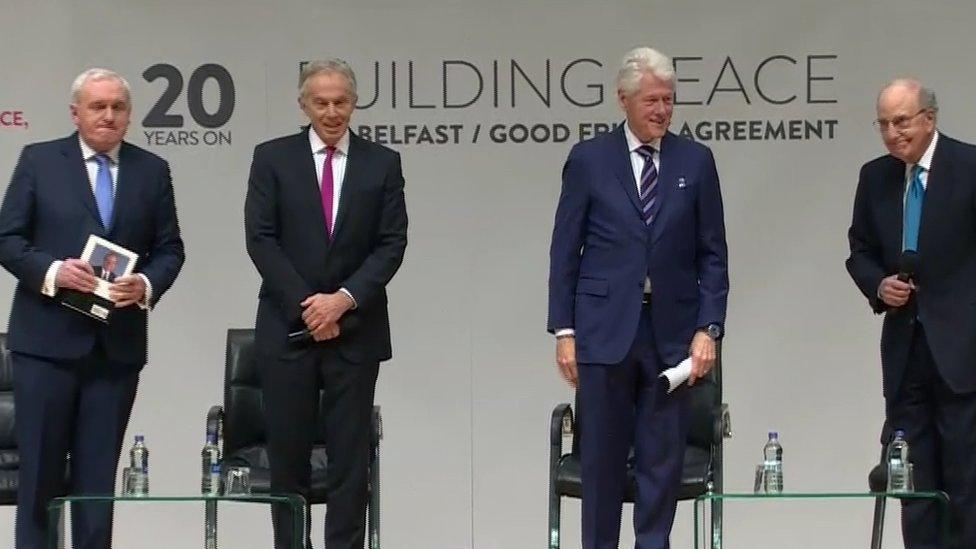
Bertie Ahern, Tony Blair, Bill Clinton and George Mitchell are in Belfast for the anniversary
The Good Friday Agreement was a "work of genius" which helped to preserve the concept of democracy, former US president Bill Clinton has said.
He was addressing a Belfast conference to mark the 20th anniversary of the 1998 deal, which helped to end 30 years of violence in Northern Ireland.
Mr Clinton was taking part in a panel discussion with former British PM Tony Blair and former Irish PM Bertie Ahern.
Mr Blair said the 1998 deal took "real courage" by Northern Ireland parties.
He added that for "all its faults", the Good Friday Agreement was "worth doing and worth keeping".
The anniversary celebrations have been overshadowed by the absence of devolution due to serious problems between Stormont's two biggest parties, the Democratic Unionist Party (DUP) and Sinn Féin.
'Preserving democracy'
The three former leaders urged Northern Ireland's current political parties to keeping working to restore power sharing.
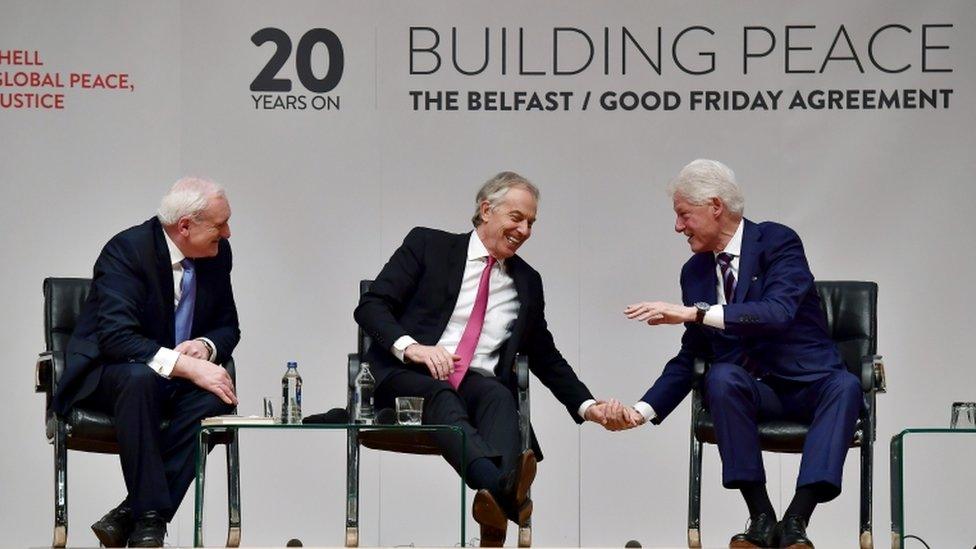
The three men were lauded for their role in the peace process
Mr Ahern said: "The art of politics is compromise, you can't make progress without compromise.
"Compromise is when people come together and say, 'listen, this is the dilemma, this is the difficulty, this is what is unsaleable to my people' and let us try and find a way out."
Reflecting on legacy of the 1998 deal, Mr Clinton said: "The Good Friday Agreement is a work of genius that's applicable if you care at all about preserving democracy.
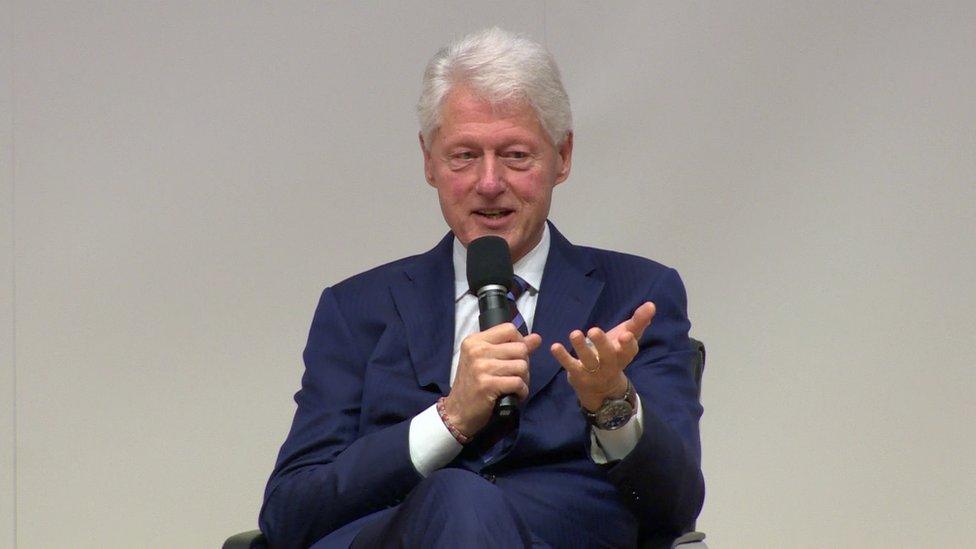
Bill Clinton said the deal was a "work of surpassing genius"
"It called for real democracy - majority rule; minority rights; individual rights; the rule of law; the end of violence; shared political decision-making; shared economic benefits."
'Unrecognisable'
Mr Clinton added that the deal had "maintained the relationship with the United Kingdom, expanded the relationship with the Irish Republic, and then, let the future take its course".
"The most interesting thing was by creating a space for the identity and the interests and the values of all the people involved - in a framework which protected democracy and let future demographic, economic and political changes take Northern Ireland wherever it would go - it was a work of surpassing genius."
Gerry Adams describes how he knew the Good Friday Agreement would be embraced by most of people
The anniversary conference took place at Queen's University, Belfast and the panel discussion was chaired by former US Senator George Mitchell, who also chaired the 1998 talks.
Mr Mitchell told the audience the Northern Ireland of today was "unrecognisable" and a "better place" than the one he worked in 20 years ago.
He acknowledged there were problems at the moment, but urged current political leaders to show the same "vision and courage that the leaders of Northern Ireland in 1998 demonstrated".
'Heroes'
"History will look back on this day as a reflection of how far we have come in Northern Ireland and how much further we still have to travel," Mr Mitchell said.
George Mitchell: Northern Ireland is a better place now
He asked the audience to give a standing ovation to the former leaders who delivered the Good Friday Agreement, hailing them as "heroes and peacemakers".
"Today across the western world, it's considered fashionable to demean and insult political leaders, and certainly much is deserved, but we don't pay enough attention or tribute to those political leaders who do dare greatly and succeed," he added.
"In Northern Ireland, these were ordinary men and women but after 700 days of failure, they joined in one day of success and they changed the course of history."
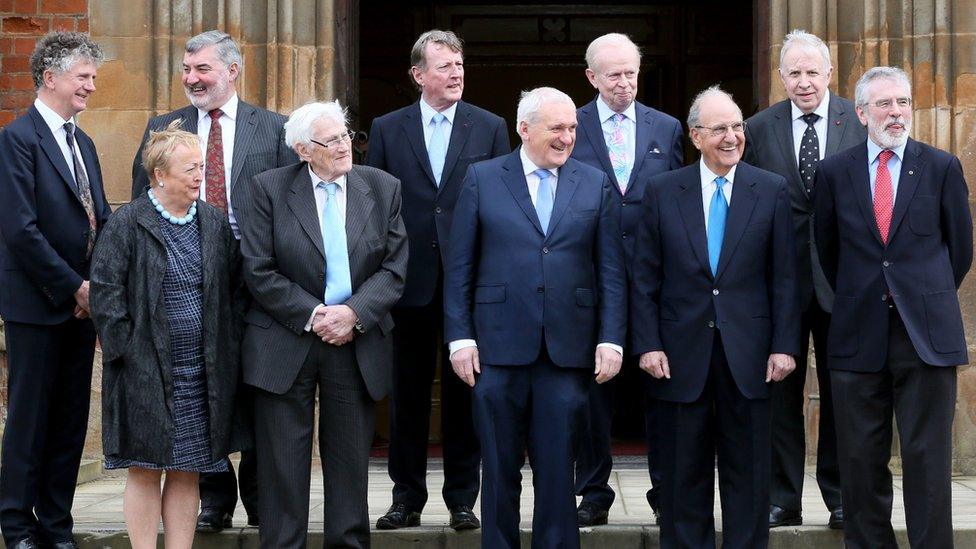
Members of the 'Class of 1998' posed for photos outside Queen's University
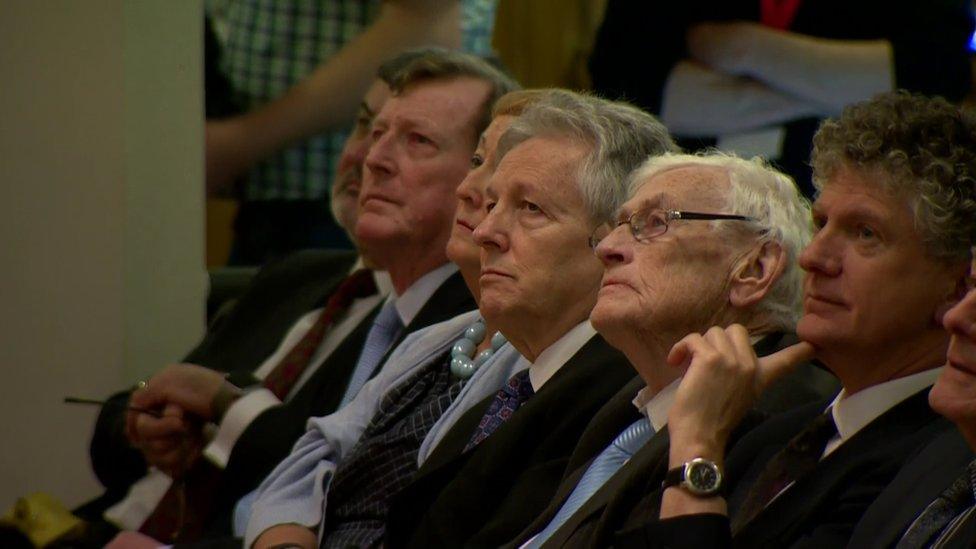
Several former party leaders were in the audience at Queen's University
Later, in a ceremony at the Ulster Hall, President Clinton and Senator Mitchell received the freedom of Belfast - the 83rd and 84th recipients of the honour.
Alongside the Lord Mayor, Nuala McAllister, and with a stage filled with city councillors, the two men received a warm ovation from an invited audience.
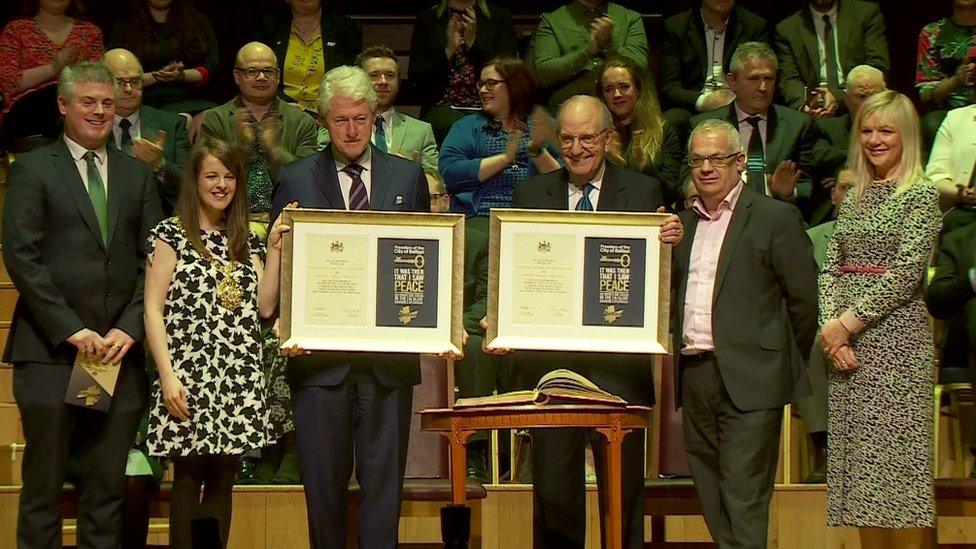
President Clinton and Senator Mitchell holding their certificates granting them Freedom of the City of Belfast
The former senator, whose father's parents were from Ireland, also said that his personal role in the peace process had reconnected him with his Irish heritage.
"Many of you have thanked me for my work here. My response is that it is I who should be grateful, and I am, for you have filled an inner void that I didn't even know existed.
"I am an American and very proud of it, but a large part of my heart and of my emotions will forever be with the people of Northern Ireland.
"May God bless them with peace, with prosperity and true reconciliation."

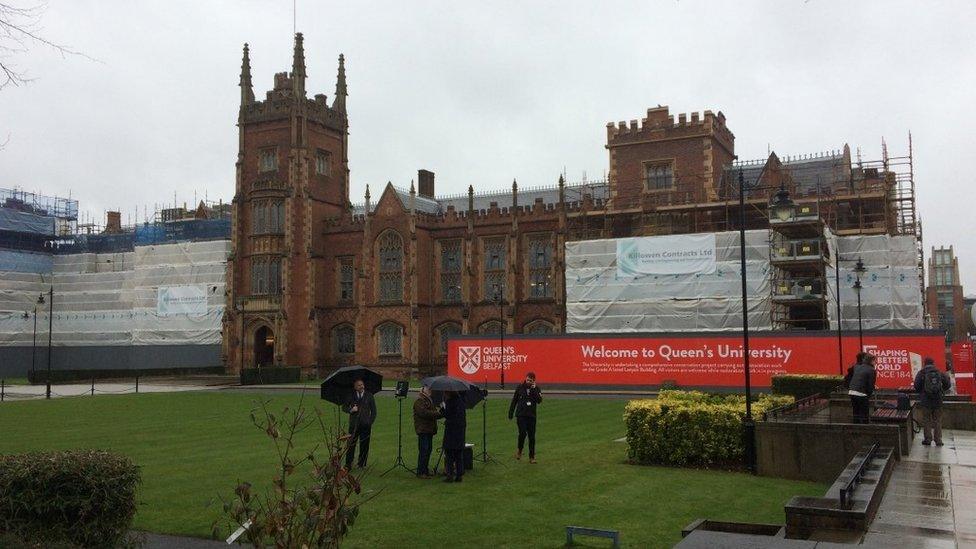
At the scene: BBC News NI political correspondent Enda McClafferty
The scaffolding outside Queen's University said it all: This is still a work in progress.
That was the message delivered inside by the architects of the Good Friday Agreement.
This was not a day for back slapping but a moment to take stock.
Yes, to share memories but also to deliver messages to the current crop of political leaders about the stalemate at Stormont.
The call from the class of '98 was clear: Finish the job started 20 years ago.

Mr Mitchell played a key role in broking the agreement that was then ratified in a referendum on both sides of the Irish border in May 1998.
It set up a power-sharing assembly to govern Northern Ireland by cross-community consent.
However, the deal proved difficult to implement and was amended by the St Andrew's Agreement in 2006.
A bitter dispute between the DUP and Sinn Féin led to the collapse of their power-sharing government in January 2017 and despite several rounds of talks to resolve the crisis, the executive has not met for 16 months.
Seamus Mallon says he feels anger 20 years on from the Good Friday Agreement
"The lesson with these things... is that once you've got a viable peace process you've got to just work at it and work at it and realise that the right comparison is with what things were like during the course of the Troubles," Mr Blair told the BBC's Today programme.
"We used to wake every day to death and destruction."
'Trimble bullied'
The DUP's Sir Jeffrey Donaldson, who was part of the Ulster Unionist negotiating team in the run-up to the agreement, said the party's then leader David Trimble was bullied into signing a flawed deal.
Key architects of the agreement recall the days leading up to Good Friday 1998
"It didn't see an end to paramilitarism, it didn't see the promised political stability that the agreement heralded and here we are 20 years on from the agreement without a government," he said.
"Northern Ireland is in a better place today than it was 20 years ago, that's for sure, but we still have a long way to go and the flaws in the agreement that were not addressed at the time still need to be addressed."
Peter Robinson says he was right to oppose the Good Friday Agreement
Sinn Féin's Máirtín Ó Muilleoir said the promise of the agreement had not been fulfilled.
"The spirit endures... the letter of the Good Friday Agreement endures... the principles of the Good Friday Agreement will guide us," he said.
"It was founded on this awkward but marvellous architecture of rights and of inter-relationships and interconnections and I think we have to return to that and this issue of rights."
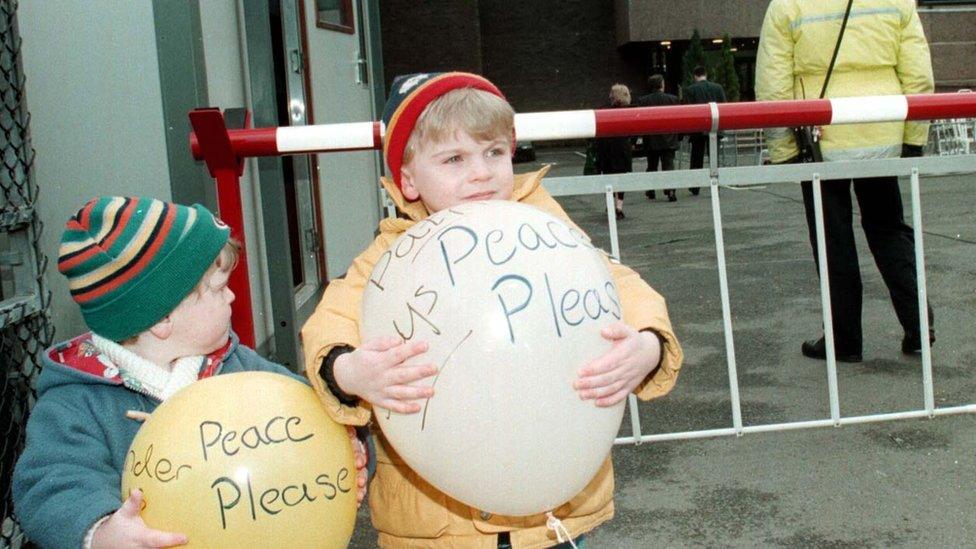
The Good Friday Agreement came after decades of conflict in Northern Ireland
- Published10 April 2018
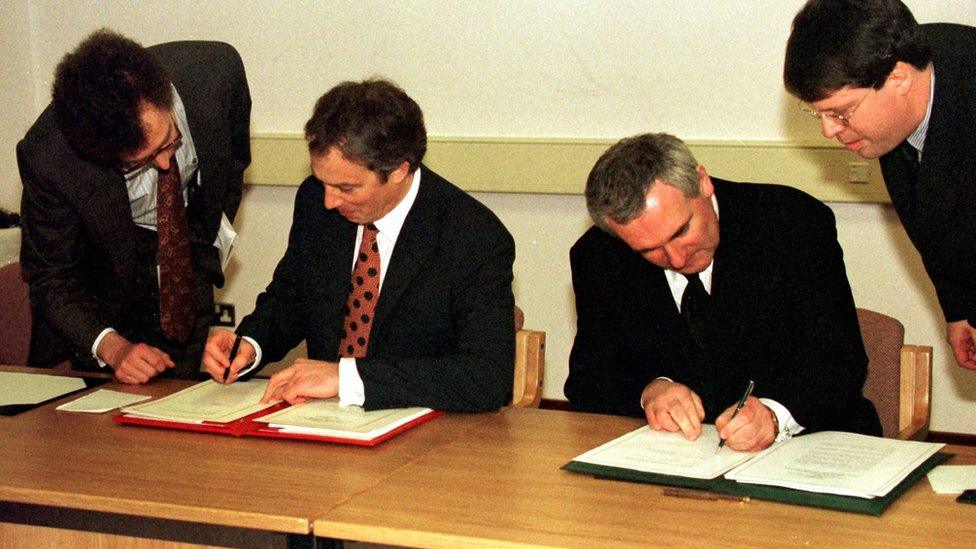
- Published10 April 2018
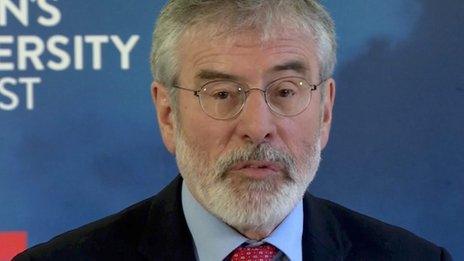
- Published10 April 2018
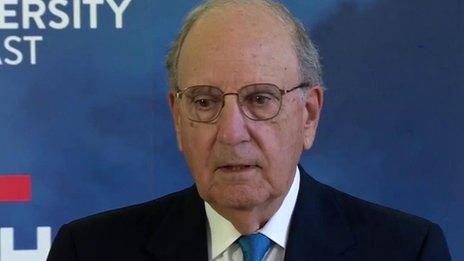
- Published9 April 2018
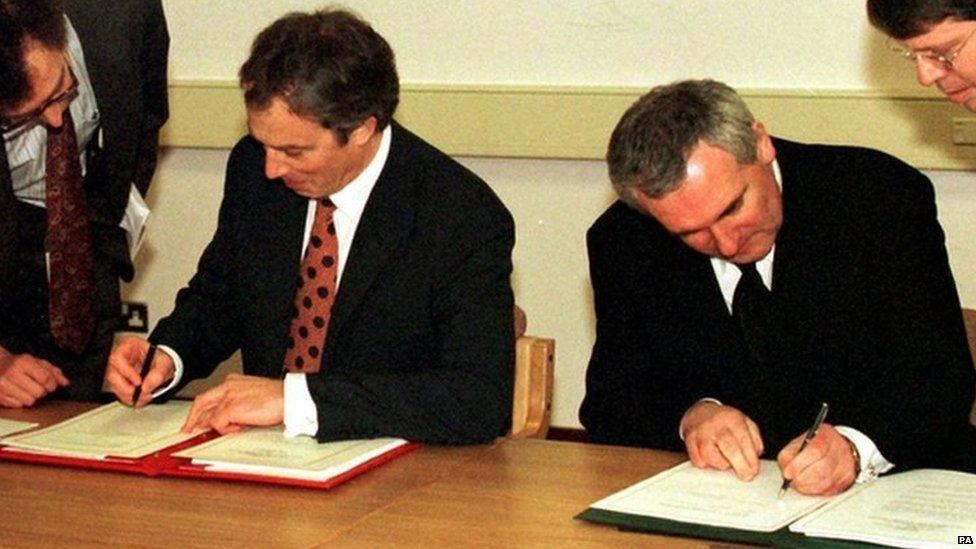
- Published10 April 2018
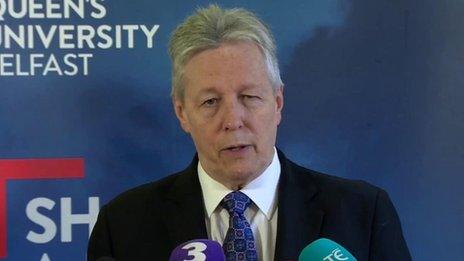
- Published10 April 2018
